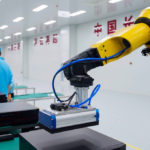The robots are no longer coming; they are here. The COVID-19 pandemic is hastening the spread of artificial intelligence (AI), but few have fully considered the short- and long-run consequences.
In thinking about AI, it is natural to start from the perspective of welfare economics – productivity and distribution. What are the economic effects of robots that can replicate human labour? Such concerns are not new. In the nineteenth century, many feared that new mechanical and industrial innovations would “replace” workers. The same concerns are being echoed today.
Consider a model of a national economy in which labour performed by robots […]
Full Post at www.interest.co.nz
